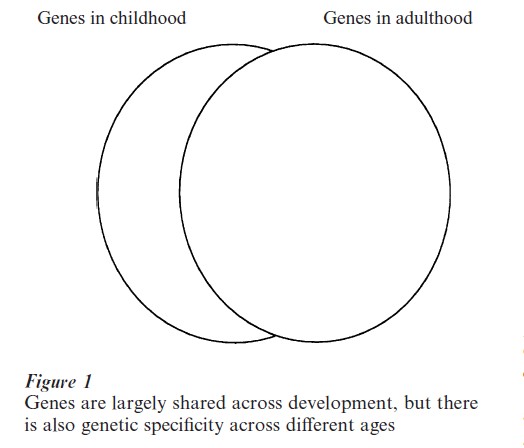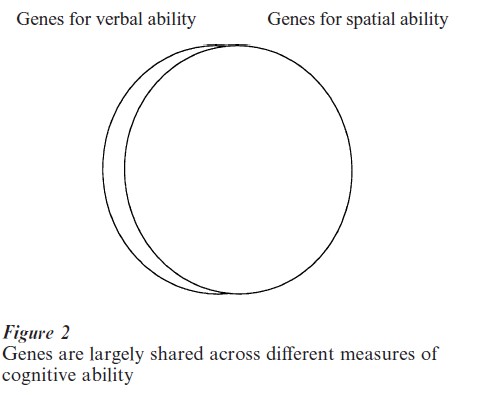Sample Genetic Factors In Intelligence Research Paper. Browse other research paper examples and check the list of research paper topics for more inspiration. If you need a research paper written according to all the academic standards, you can always turn to our experienced writers for help. This is how your paper can get an A! Feel free to contact our custom research paper writing service for professional assistance. We offer high-quality assignments for reasonable rates.
Research has not only established the importance of both genetic and environmental influences on human intelligence, but has also begun to examine how genes shape intellectual development and the relationship among different cognitive skills (e.g., verbal and performance ability). Additionally, researchers have begun to search for DNA markers associated with human cognitive ability. This research paper will not only examine these new research directions, but will also discuss the implications of these findings in the context of the environment.
Academic Writing, Editing, Proofreading, And Problem Solving Services
Get 10% OFF with 24START discount code
1. Behavioral Genetics, Genes, And Intelligence
One of the major misconceptions about behavioral genetics is that the purpose of this research is to examine whether genes or the environment is operating. Instead, behavioral genetics assumes that differences in intelligence, for example, are due to differences in genes, the shared family environment (the environment that family members share, such as socioeconomic status), the nonshared environment (the environment that makes family members different, such as differential parenting and different experiences), and error. Genetic influences on intelligence are statistically significant, averaging around 50 percent when collapsing across all available twin and adoption studies (see Brody 1992 for a review). In other words, genes account for roughly half of the measured variability in intelligence.
2. Beyond Heritability
While a heritability of 50 percent is important in terms of the nature nurture debate, finding that intelligence
‘ is both ’ genetic and environmental (the other 50 percent has to be due to nongenetic influences) in and of itself does not elucidate how genes influence the development of human intelligence. Behavioral genetics has begun to move beyond heritability and, as a result, has reported findings that fundamentally change how we think about the development of intelligence.
2.1 Genes Become More, Not Less Important With Age
A common assumption is that genes become less important with age, as environmental influences ‘ add up ’ to shape cognitive performance. Behavioral genetic results suggest that the opposite is the case. Although genes account for 50 percent of individual difference in intelligence collapsed across all studies, heritability appears to vary with age, starting at around 40 percent in early childhood, rising to 60 percent in early adulthood, and to 80 percent in later life (see Plomin et al. 1997). More recent evidence suggests that the genetic influences on intelligence may decline to around 60 percent in old age (Finkel et al. 1998, McClearn et al. 1997).
2.2 Genes Drive Stability, But Are Not Invariant Across Development
Another new research question addressed by genetic methods is the extent to which the genes that influence cognitive abilities at one age are the same genes that influence cognitive abilities at later ages. Are genes relating to intelligence immutably ‘ on ’ from birth, or do different genes turn on and off across development? Results (see Plomin et al. 1997) suggest that genes are largely stable, with some genetic change across development (see Fig. 1). In contrast, the environment is largely responsible for the changes in intelligence across development.

2.3 Genes Also Drive The Correlation Among Different Aspects Of Cognitive Ability
One of the most interesting ‘ new directions ’ in behavioral genetics research involves the examination of how genes influence different aspects of cognitive ability. Are the genes that influence verbal skills the same as those that influence spatial ability or are verbal and spatial skill each influenced by different genetic processes? This debate, often called the molarity vs. modularity debate, has important implications for cognitive neuroscience. A molar system is one in which different aspects of cognitive ability, such as verbal ability, spatial ability, perceptual speed, and memory, are all influenced by a common set of genes. A modular system, in contrast, holds that genes function independently across different cognitive skills. In multivariate behavioral genetics, this degree of overlap is often measured by a genetic correlation. A high genetic correlation suggests almost complete overlap while a low genetic correlation suggests genetic independence. Behavioral genetic studies suggest that the genetic correlation approaches 1.0, suggesting almost complete genetic overlap (see Petrill 1997). The genes that influence spatial ability, for example, are largely the same genes that influence verbal ability (see Fig. 2). Genes are the ‘ tie that binds ’ different cognitive skills while the discrepancy between different cognitive skills (e.g., certain people may be better at verbal as opposed to spatial skills) is due largely to the environment.

2.4 Molecular Genetics And Intelligence Cognition
One of the most quickly developing areas of behavioral genetics involves the search for DNA markers associated with human cognitive ability. For example, the APOE-4 marker is associated with a four-fold increase in risk for developing late-onset Alzheimer ’s disease (Breitner et al. 1998). Another notable example is the continuing research on the association between DNA markers on Chromosome 6 and reading disability (see Gayan et al. 1999).
While these markers are important in that they show that differences in the human cognitive system are associated with specific DNA markers, these studies do not necessarily show that individual differences in healthy, normally distributed cognitive functioning are influenced by these same DNA markers. A study called the IQ-QTL Project is attempting to search for DNA markers associated with intelligence. In 1998 this study yielded the first replicated DNA marker associated with intelligence (Chorney et al. 1998) and is expected to complete a full genome scan, likely yielding other markers for intelligence.
3. Implications
Taken together, these data not only suggest that genes influence the development of intelligence, but that intelligence develops differently than once thought. Genes become more, not less important as the age of the sample increases. Genes influence the correlation among measures of intelligence, both across time and across different measures of cognitive performance. Additionally these behavioral genetic results, although indirectly measured through twin and adoption studies, are beginning to be tied to specific DNA markers. What are the implications of these data?
3.1 Dna Markers Will Likely Be General In Effect
Although the search for DNA markers is in its infancy, it is likely that the first decade of the twenty-first century will yield a set of DNA markers that account for a significant proportion of the variance in intelligence. Given the fact that twin and adoption research suggests a great deal of genetic overlap, it should be expected that DNA markers will cut across different cognitive skills, and will be stable over time. This ‘ molar ’ focus will become increasingly important as researchers turn from simply trying to find markers associated with cognitive ability to attempting to delineate the mechanism by which genes influence complex cognitive skills.
3.2 The Environment Is Also Important
A significant heritability estimate, genetic correlation, or DNA marker associated with intelligence does not mean that intelligence cannot be modified by the environment. For one, the environment is an important determinant of individual differences in intelligence, especially in childhood (the heritability of intelligence is roughly 40 percent, which means that the other 60 percent has to be due to nongenetic influences). More importantly, although heritability describes why individuals differ within a group, it does not examine average increases in ability or average differences in ability between groups. Although genetic influences account for 90 percent of the individual differences in height, for example, the height of the average person has increased, presumably due to an average improvement in the environment. Similarly, although the heritability of IQ has remained stable across the 80+ years that twin studies have been conducted, the measures used to measure IQ have been restandardized numerous times. The average IQ, although set to be 100 on a particular test, increases over time. Put another way, if a random sample of children in 1999 were given an intelligence test standardized in 1920, the average IQ would be significantly greater than 100 (Flynn 1998). Thus, behavioral genetic methods tell us ‘ what is ’ for a specific population at a specific time, not ‘ what will be ’ or ‘ what should be ’ (Plomin and Petrill 1997).
In fact, some of the most important discoveries about the relationship between the environment and intelligence have come through behavioral genetic research. As stated earlier, behavioral genetics separates the environment into that which is shared by family members and that which is not shared by family members. Thus, behavioral genetic methods allow the examination of environmental effects that operate between families (shared environment), and environmental effects that operate within families (nonshared environment). The same behavioral genetic studies that suggest increasing heritability and high genetic correlations also suggest that the most pervasive environmental influences across the lifespan are nonshared. In other words, the most important environmental effects are those that make family members different from one another. Behavioral genetic studies are currently attempting to identify these nonshared environmental influences.
4. Summary And Conclusions
Genetic influences are important to understanding intelligence. However, the environment is also important. Intelligence tests are not a veridical window into genetic potential nor are they indices of environmentally driven learning. Intelligence is defined by measures of behavior and is thus subject to both genetic and environmental effects. The key issue is understanding how genes and environment work together to yield cognitive development.
Bibliography:
- Breitner J C S, Jarvik G P, Plassman B L, Saunders A M, Welsh K 1998 A risk of Alzheimer disease with the epsilon 4 allele for apolipoprotein E in a population-based study of men aged 62–73 years. Alzheimer Disease and Associated Disorders 12: 40–4
- Brody N 1992 Intelligence, 2nd edn. Academic Press, San Diego
- Chorney M J, Chorney K, Seese N, Owen M J, Daniels J, McGuffin P, Thompson L A, Detterman D K, Benbow C, Lubinski D, Eley T, Plomin R 1998 A quantitative trait locus associated with cognitive ability in children. Psychological Science 9: 159–66
- Finkel D, Pedersen N L, Plomin R, McClearn G E 1998 Longitudinal and cross-sectional twin data on cognitive abilities in adulthood: The Swedish adoption twin study of aging. Developmental Psychology 34: 1400–13
- Flynn J R 1998. IQ gains over time: Toward finding the causes. In: Neisser U (ed.) The Rising Cur e. American Psychological Association, Washington, DC
- Gayan J, Smith S D, Cherny S S, Cardon L R, Fulker D W, Brower A M, Olson R K, Pennington BF, DeFries J C 1999
- Quantitative-trait locus for specific language and reading deficits on chromosome 6p. American Journal of Human Genetics 64: 157–64
- McClearn G E, Johansson B, Berg S, Pedersen N L, Ahern F, Petrill S A, Plomin R 1997 Substantial genetic influence on cognitive abilities in twins 80 or more years old. Science 276: 1560–3
- Petrill S A 1997 Molarity versus modularity of cognitive functioning? A behavioral genetic perspective. Current Directions in Psychological Science 6: 96–9
- Plomin R, DeFries J C, McClearn G E, Rutter M 1997 Behavioral Genetics, 3rd edn. W. H. Freeman, New York
- Plomin R, Petrill S A 1997 Genetics and intelligence: What’s new? Intelligence 24: 53–78




